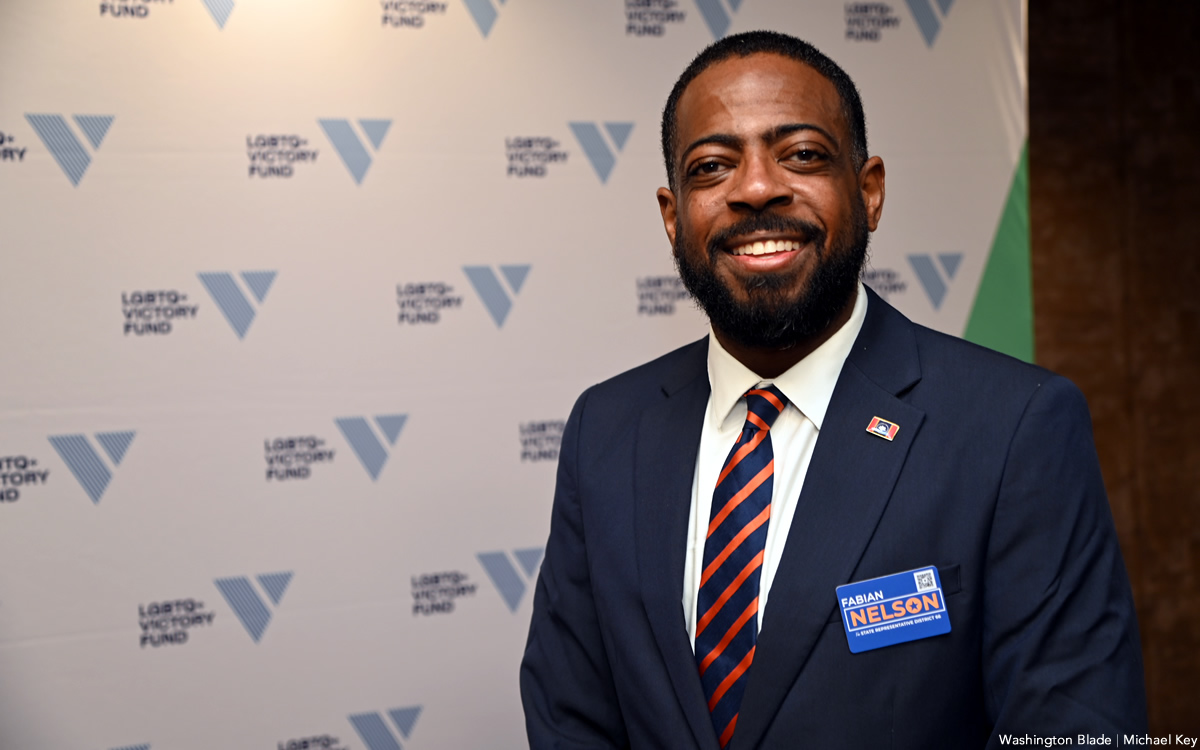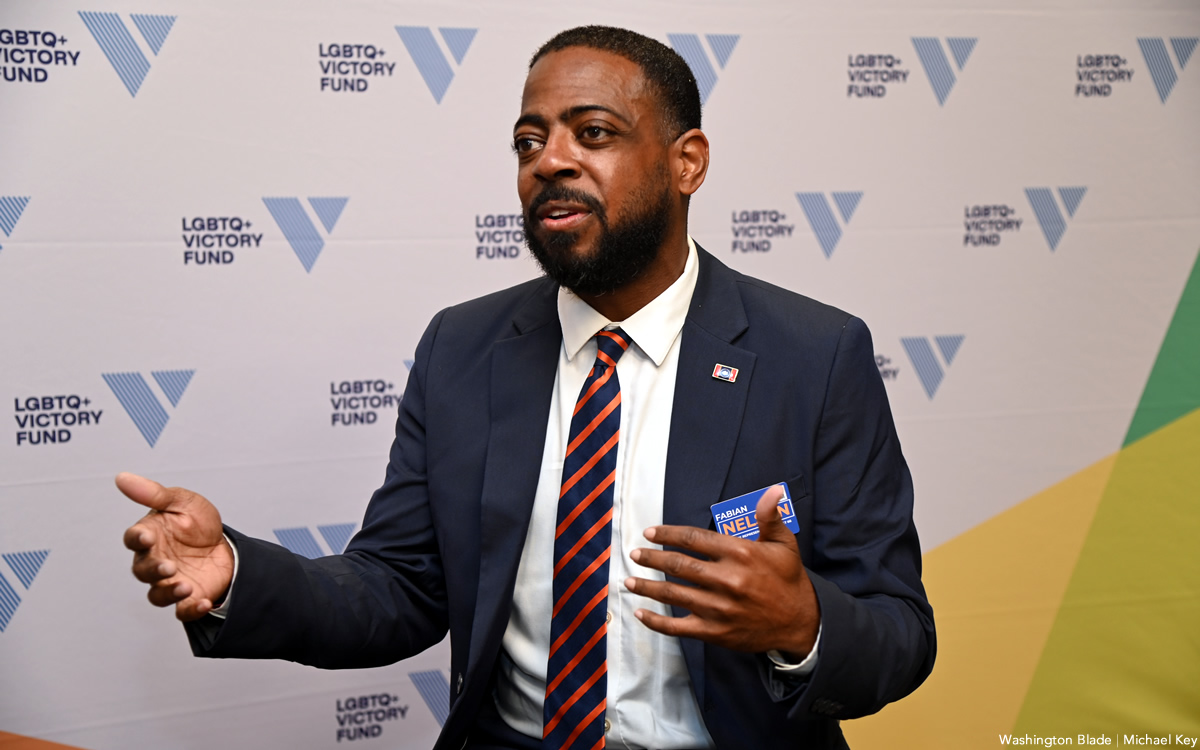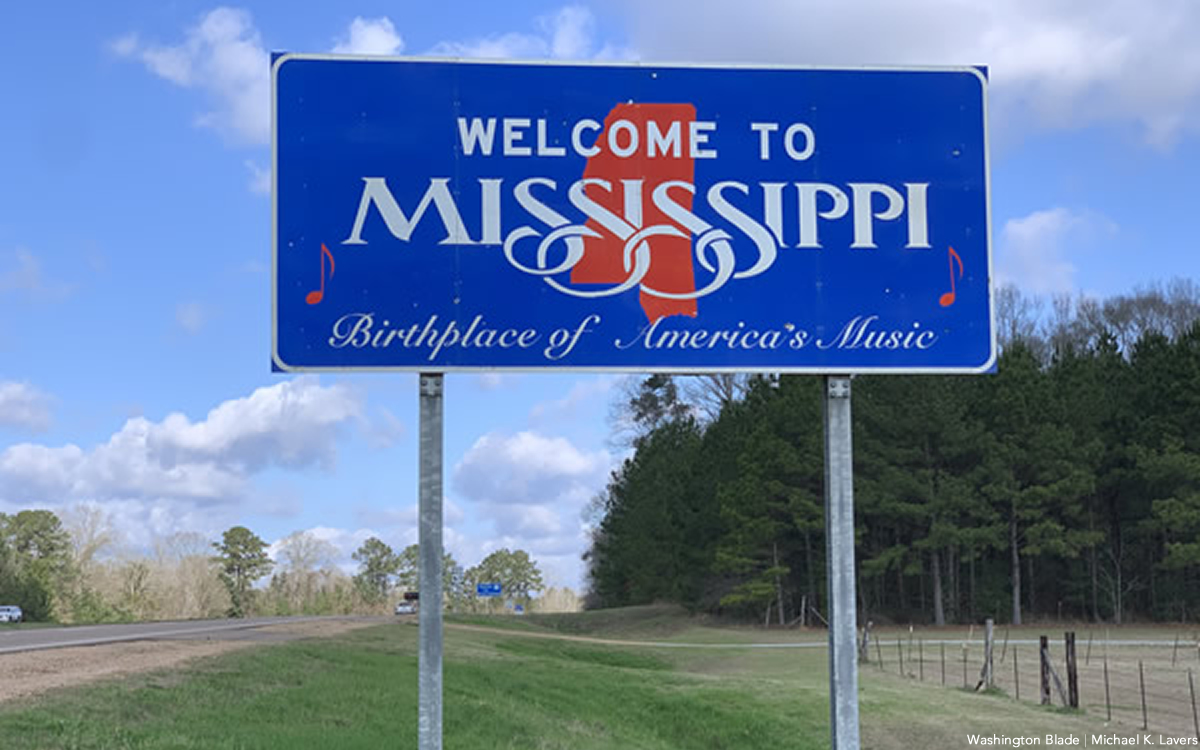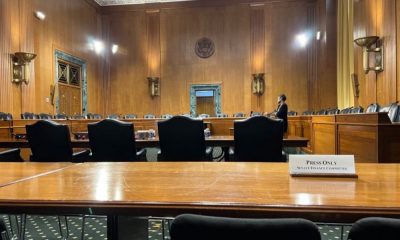Mississippi
Fabian Nelson is ready to make history as Mississippi’s first LGBTQ state lawmaker
Must first face Democratic opponents in Aug. 8 primary

During the LGBTQ Victory Fund’s National Champagne Brunch Sunday morning in Washington, D.C., the Washington Blade spoke with Fabian Nelson, a Black and gay Democratic candidate who could become the first out LGBTQ lawmaker ever to serve in the Mississippi Legislature.
Nelson will square off against two opponents from his party in the Aug. 8 primary. If successful, he would face a general election on Nov. 7, an easier gambit provided the seat to represent Mississippi’s 66th House District is solidly Democratic, Nelson said.
Notwithstanding his electoral prospects, Nelson acknowledged the challenges with racism and homophobia that he has continued to contend with as a candidate, along with the hostile political environment in which he would serve if elected. Still, he is optimistic about the trajectory of his campaign and for the potential to move Mississippi in a better direction.
“I come from a family of a lot of ‘firsts,’” Nelson said. His grandfather opened a bank in the early 1900s for Black residents of his hometown, while his grandmother was the first Black nurse to integrate the hospital in Yazoo City and his father was the first Black graduate of Virginia Commonwealth University’s dental school.
“They keep raising the bar, so I have to raise it a little bit higher,” he said.
Mississippi has a Republican trifecta as well as a Republican triplex, which means the party exerts tremendous political power with control over both chambers of the state’s legislature and the governorship, along with the offices of the secretary of state and attorney general.
If elected, Nelson would represent residents of Mississippi’s majority-Black state capital, Jackson – which has long suffered with issues like high poverty rates and rising crime, including gun violence.
Years of poor governance have exacerbated these problems, while the state’s conservative legislators have used the city’s condition as a pretext to strip residents of the right to choose their elected leaders.
Nelson has an expansive range of policy areas that he said will be major priorities should he win the House seat, from expanding Mississippi’s Medicaid program to fighting back against the conservatives’ disenfranchisement of his constituents in Jackson and their harmful anti-LGBTQ legislative proposals.
Anti-LGBTQ legislative bigotry coupled with homophobic personal attacks
During Mississippi’s first legislative session of 2023, lawmakers considered 31 anti-LGBTQ bills, more than were introduced anywhere else in the country.
Nelson, who was involved in advocacy against these legislative proposals as a member of the Human Rights Campaign, noted the importance of mobilizing the public’s opposition to anti-equality bills in helping to defeat 30 of those 31 proposals that failed to pass in the last session.
Unfortunately, Nelson said, the lone bill that survived was perhaps the most harmful of those under consideration in the chamber – a measure barring access to guideline directed gender affirming health care interventions for youth in Mississippi with gender dysphoria, which the governor signed into law in late February.
It was a major blow, Nelson acknowledged. At the same time, he said, pushing back more effectively against Republican messaging on the healthcare ban, such as by framing its proponents as politicians who are trying to “play doctor,” may have yielded a different outcome.
Nelson is not just encountering anti-LGBTQ bigotry in the legislative context, but also that which has been directed at him personally as a gay candidate for public office in a deep-red state in the Deep South. Especially in Mississippi and among older folks in the state, homophobia can come from voters and elected officials even from his own party, Nelson said.
“I think [my] being LGBTQ may pose a problem with some of the Democratic lawmakers” in the chamber, he said.
Nelson told the Blade one of his supporters, an 80-year-old Jackson resident whom he affectionately calls “Miss Emma,” was approached by a Democratic opponent who asked her, “How do you feel about [Nelson] being gay with his [LGBTQ] agenda?”
“All these years, I’ve voted for straight people,” Nelson said she told him. “None of them came and picked my garbage up or cleaned my flowerbed out.”
Following the city government’s shutdown of trash hauling services earlier this month, Nelson said he had personally been picking up and disposing of garbage for Miss Emma along with Jackson’s other elderly or disabled residents.
Nelson said effectuating real change is possible when pro-equality candidates run for office, fight for their constituents, establish relationships with colleagues on both sides of the aisle, and communicate effectively with the public about what is (and is not) happening in the Capitol building to encourage more active civic engagement and strengthen political organizing efforts.
Entrenched issues of racial justice

Nelson’s campaign comes amid the scandal over the GOP-led Tennessee House of Representatives’ expulsion of two Black Democratic lawmakers from the chamber, which was widely denounced as racially motivated.
Meanwhile, over the Mississippi border into Alabama, the state’s Republican Gov. Kay Ivey last week ousted the Black director of early childhood education, Barbara Cooper, for including teaching on concepts like inclusion and structural racism.
Asked how he expects to contend with racism in the chamber if elected, Nelson said conflict can be minimized and discussions made more productive in many cases by practicing active listening so those with different views feel heard.
“You don’t have to be the loudest one in the room to make an impact” he said, so long as you are “standing your ground when it comes to bad legislation and, you know, standing my ground and fighting for what I believe in, not backing down.”
Engaging members of the public and bringing them into the fold is another crucial tool, Nelson said. He pointed to the public outcry in Tennessee and across the country that led voters to return state Reps. Justin Pearson and Justin Jones to their democratically elected seats in the legislature.
Residents in Jackson were not only deprived by their government of garbage collection services, but also suffered the near collapse of the city’s water system, prompting the U.S. Department of Justice to step in with a lawsuit last year on behalf of the Environmental Protection Agency’s Office of Civil Rights.
Meanwhile, rising crime in Jackson and calls for an increased police presence created the pretext for Mississippi’s Republican lawmakers to pass H.B. 1020, legislation that will allow conservative state officials to appoint, rather than allowing constituents to elect, judges and prosecutors in the city’s sprawling Capitol Complex Improvement District.
They will serve alongside a Capitol Police force whose jurisdiction was expanded despite the department’s officers having shot four citizens since last August with little explanation or accountability.
News that the governor signed H.B. 1020 into law last week had instigated protests, by which point Nelson said it was already too late. He said the time to rally opposition among voters, which would have first required effectively reaching them with information about how the law would strip them of political power and autonomy to pick their elected officials, was immediately after Republican lawmakers had introduced it.
“If you have the citizens, the people, in your corner,” he said, “you cannot lose when you start exposing this bad stuff that’s happening.”
“And one more thing,” Nelson said, pointing to a pin on the lapel of his jacket, “this is our new state flag.”
Four years ago, amid considerable pressure from the public, the GOP-controlled legislature made the extraordinary decision to replace Mississippi’s state flag that had flown since 1894, which depicted the Confederate battle flag in its upper left canton.
The new banner features a white magnolia blossom befitting of the state’s official nickname.
Mississippi
Fabian Nelson poised to become Mississippi’s first LGBTQ lawmaker
Democrat defeated opponent in runoff

Fabian Nelson, a Black and openly gay Democratic candidate, looks to become the first out LGBTQ lawmaker ever to serve in the Mississippi legislature.
The Associated Press reports that Nelson, a 38-year-old realtor from Byram in the south Jackson metro area, in the Aug. 8 primary defeated his opponent Roshunda Harris-Allen, an education professor at Tougaloo College and Byram alderwoman.
The race to represent Mississippi’s 66th House District was decided in a runoff after neither Nelson nor Allen received a majority vote. Since the Republican Party did not field a candidate for the general election, Nelson will go on to be sworn into office when the state legislature meets in January.
“I still think I’m in a dream. I’m still trying to process it and take it in,” Nelson said in an interview with the AP on Wednesday. “It’s still shocking to me, I have to be honest.”
In a statement, Annise Parker, president of the LGBTQ+ Victory Fund, said Mississippi is “one of the last two states to achieve the milestone of electing an out LGBTQ+ lawmaker.”
“Voters in Mississippi should be proud of the history they’ve made but also proud to know they’ll be well-represented by Fabian,” Parker said.
White House Correspondent Christopher Kane spoke with Nelson last spring during the Victory Fund’s National Champagne Brunch in D.C. Nelson acknowledged the challenges with racism and homophobia that he has continued to contend with as a candidate, along with the hostile political environment in which he would serve if elected. Still, he is optimistic the potential to move Mississippi in a better direction.
“At the end of the day, I put my suit on the same way every other person who walks in that statehouse does,” Nelson told the AP on Wednesday after his victory was assured. “I’m going to walk in there, and I’m going to be a sound voice as to why things like this can’t continue to go on in the state of Mississippi.”
Mississippi has a Republican trifecta as well as a Republican triplex, which means the party exerts tremendous political power with control over both chambers of the state’s legislature and the governorship, along with the offices of the secretary of state and attorney general.
Nelson would represent residents of Mississippi’s majority-Black state capital, Jackson, which has long suffered with issues like high poverty rates and rising crime, including gun violence.
Years of poor governance have exacerbated these problems, while the state’s conservative legislators have used the city’s condition as a pretext to strip residents of the right to choose their elected leaders.
Nelson has an expensive range of policy areas that he said will be major priorities should he win the House seat, from expanding Mississippi’s Medicaid program to fighting back against the conservatives’ disenfranchisement of his constituents in Jackson and their harmful anti-LGBTQ legislative proposals.
Nelson is not just encountering anti-LGBTQ bigotry in the legislative context, but also that which has been directed at him personally as a gay candidate for public office in a deep-red state in the deep south. Especially in Mississippi and among older folks in the state, homophobia can come from voters and elected officials even from his own party, Nelson said.
“I think [my] being LGBTQ may pose a problem with some of the Democratic lawmakers” in the chamber, he said.
The AP also noted that Nelson was endorsed by the Human Rights Campaign, the nation’s largest LGBTQ rights organization.
“It sends a real message in a time when we are seeing attacks legislatively and through violence against the LGBTQ+ community that the majority of people reject that kind of animus,” Rob Hill, state director of HRC’s Mississippi chapter, said in an interview after Nelson’s victory. “I think a lot of youth around the state who have felt like their leaders are rejecting them or targeting them won’t feel as lonely today.”
Christopher Kane contributed to this story.
Mississippi
ACLU challenges Miss. high school over transgender student’s dress
Lawsuit filed against Harrison County School District

The American Civil Liberties Union and the ACLU of Mississippi have filed a lawsuit against Harrison County School District after school officials told a graduating transgender student she could not wear a dress or heeled shoes to her graduating ceremony as requested by her and her parents.
L.B. is a trans girl and graduating senior of the class of 2023 at Harrison Central High School. She has been looking forward to finally walking across the stage at her high school graduation this Saturday and picked out a dress and pair of heeled shoes months ago to wear under her traditional cap and gown in accordance with the school’s dress code for female students. On May 9, L.B. and her parents were informed by Principal Kelly Fuller that the school would enforce the male dress code against L.B. In a call with L.B.’s mother, Harrison County School District Supt. Mitchell King said that L.B. “needs to wear pants, socks, and shoes like a boy” in statements that repeatedly misgendered her.
The superintendent cited a written dress code policy, distributed last week, that requires girls to wear white dresses and boys to wear black suits. There is no reported enforcement of this policy against students who are not trans and school officials have not taken any steps to check the planned outfits for other students.
“My graduation is supposed to be a moment of pride and celebration and school officials want to turn it into a moment of humiliation and shame,” said L.B. “The clothing I’ve chosen is fully appropriate for the ceremony and the superintendent’s objections to it are entirely unfair to myself, my family, and all transgender students like me. I have the right to celebrate my graduation as who I am, not who anyone else wants me to be.”
“It’s deeply offensive the school would choose to take a celebration of our daughter and her accomplishments and attempt to ruin it with such discriminatory action,” said Samantha, mother of L.B. “Like any parent of a graduating senior, we’re eager to see L.B. cross this critical threshold and enter a new stage of her life, but the superintendent is threatening this once-in-a-lifetime moment for our family. We’re so proud of our daughter and are determined to protect her from this baseless attack on her rights and her identity.”
“L.B. should be focused on celebrating this important milestone alongside her peers; however, this targeted attack by the leaders of the Harrison County School District seeks to strip her of her right to celebrate this occasion as her true self,” said McKenna Raney-Gray, staff attorney at the ACLU of Mississippi. “While we are deeply disappointed in the conduct of the Harrison County School District, we remain committed to defending the rights and autonomy of trans youth across the state, and hope that the court agrees that all students in Mississippi have the right to live as their authentic selves.”
The lawsuit, filed today in federal court, seeks an immediate temporary restraining order allowing L.B. to wear her chosen outfit.
The complaint can be found here and TRO motion can be found here.
Mississippi
Gender-affirming health care for transgender youth banned in Miss.
Republican Gov. Tate Reeves signed House Bill 1125

Republican Mississippi Gov. Tate Reeves on Tuesday signed House Bill 1125, a bill banning health care treatments for gender dysphoria for transgender youth, prohibiting doctors from providing such care and stripping parents of the right to guide medical decisions for their own children.
The American Civil Liberties Union and the American Civil Liberties Union of Mississippi issued the following statement:
“This is a devastating development for transgender youth in Mississippi and heartbreaking for all of us who love and support them. This care was already difficult to access across the state for transgender people of any age, but this law shuts the door on best-practice medical care and puts politics between parents, their children and their doctors. But this fight is far from over — we are determined to build a future where Mississippi is a safe place to raise every child. Our politicians continue to fail trans youth, so it is up to each and every one of us to rise against their fear and ignorance and surround these young people with strength, safety and love.”
Mississippi is the fifth state in the country and the third state in the past month to ban gender-affirming care for trans youth after Utah and South Dakota passed similar bans. Similar laws in Alabama and Arkansas are currently enjoined by federal courts.
“Barely two months into the year, lawmakers in three states have made it their priority to deny transgender and nonbinary youth the ability to access best-practice medical care that many rely on to simply lead happy, healthy lives,” said Kasey Suffredini, vice president of advocacy and government affairs at the Trevor Project. “Decisions around medical care should be made between parents, patients and doctors — not by politicians. While this news is heartbreaking, we want to remind trans and nonbinary young people in Mississippi that the Trevor Project has your back. We will continue working with our partners and advocates on the ground to challenge these laws and fight for a world where all young people feel safe, supported and seen for who they truly are.”
According to the Trevor Project’s new polling, 86 percent of trans and nonbinary youth say recent debates about state laws restricting the rights of trans people have negatively impacted their mental health. When asked about new policies that will ban doctors from providing gender-affirming medical care to transgender and nonbinary youth, 74 percent of trans and nonbinary youth said it made them feel angry, 59 percent felt stressed, 56 percent felt sad, 48 percent felt hopeless, 47 percent felt scared, 46 percent felt helpless and 45 percent felt nervous.
-

 Africa5 days ago
Africa5 days agoCongolese lawmaker introduces anti-homosexuality bill
-

 District of Columbia2 days ago
District of Columbia2 days agoReenactment of first gay rights picket at White House draws interest of tourists
-

 District of Columbia1 day ago
District of Columbia1 day agoNew D.C. LGBTQ+ bar Crush set to open April 19
-

 World5 days ago
World5 days agoOut in the World: LGBTQ news from Europe and Asia












